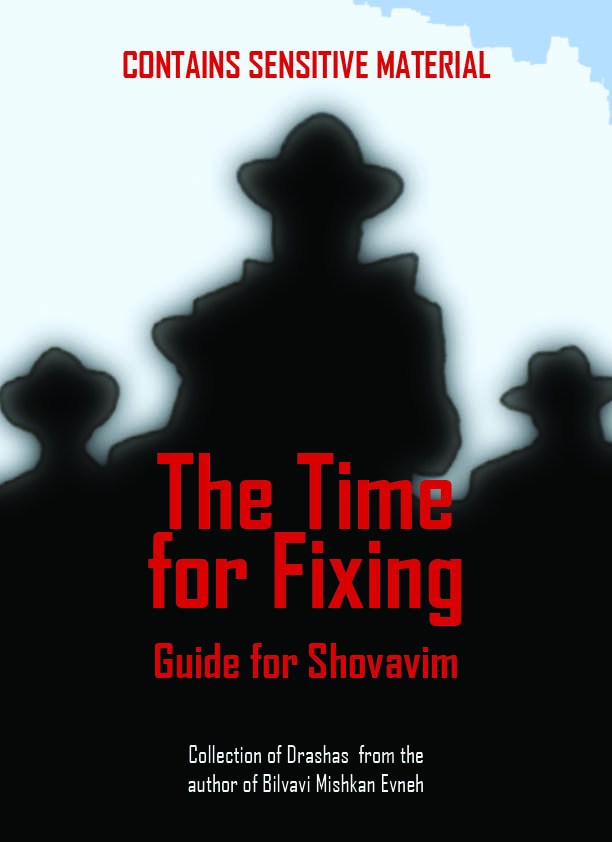- להאזנה תפילה 001 מה זה תפילה
002 Having & Missing Something
- להאזנה תפילה 001 מה זה תפילה
Tefillah - 002 Having & Missing Something
- 6543 reads
- Printer-friendly version
- שלח דף במייל
Shacharis, Minchah, and Maariv – Three Different Kinds of Tefillah
In the Gemara, there is a discussion about whether tefillah was enacted by the Men of the Great Assembly or by our forefathers whether Avraham, Yitzchok, and Yaakov (the Avos).
According to the second view, Avraham enacted Shacharis, Yitzchok enacted Minchah, and Yaakov enacted Maariv. If that is the case, then each of the three tefillos of the day is unique. They are not similar to the other, for we know that each of the Avos excelled in a unique middah (personality trait).
Avraham was the middah of chessed, or ahavah — kindness, or love. Yitzchok is the middah of gevurah, or yirah — strength, or fear. Yaakov is the middah of rachamim — compassion.
Thus, Avraham enacted Shacharis through his middah of kindness/love, Yitzchok enacted Minchah through his middah of fear of Hashem, and Yaakov enacted Maariv through his middah of compassion.
The Essence of Tefillah — Closeness to Hashem
We need to understand what is the essence of tefillah. To whom are we davening? To Hashem. Why do we turn to Hashem in tefillah? It is clear why we turn only to Hashem — we can’t turn to anyone else. But why do we turn to Him specifically through davening?
To know the answer to this, we need to clarify what exactly is the essence of tefillah.
Why do we daven? To ask Hashem our requests — or to get close to Him?
Obviously we need to request things from Hashem. But requesting of Hashem does not define what tefillah is! Tefillah is not about our requests.
What, then, is tefillah about?
Tefillah is the actual bond that we have to Hashem. There are many ways that can bring about this connection — and these are the three different tefillos of the day. But the purpose of these tefillos, however, is the relationship with Hashem that we achieve by our davening.
As we know, our soul contains many forces. Which force in our soul lets us recognize Hashem? The force of ratzon (will). We want to fill something that we lack. We lack this and that, and because we want to fill the emptiness of what we don’t have, we daven to Hashem to fill it.
This is in essence the meaning of “He hears our prayer” — how does Hashem “hear” our prayer? Through our very situation of lacking something. When we lack something, we want to fill what we are missing, so we turn to Hashem.
Shacharis — Feeling Full and Giving Myself Away For Hashem
Within the soul, there are two present forces that enable us to view situations. There is a force in the soul that makes us feel that we are lacking — “chasser” (missing). There is also a force that makes us feel that we have everything, and this is called “miluy” (full). When we feel that we lack something, and because of this, it brings us to tefillah — which then fills what we were lacking when Hashem gives us what we are lacking.
Avraham enacted Shacharis through his middah of chessed/love; when a person has love, he is feels “full” inside, because when a person truly feels loved, he feels like he lacks nothing. When a person is searching for love, he is searching for something he is missing. He is missing love in his life. But when he has love, he feels full. Thus, Shacharis, which was enacted by Avraham, represents feeling “full” inside, when a person feels that he lacks nothing.
Yitzchok, on the other hand, enacted Minchah through his middah of yirah/fear. When a person has a fear, he feels lacking in something. If a person would feel that he lacks nothing, he wouldn’t be able to become afraid, so if he is afraid, it must be that he feels somewhat lacking.
What does this mean for us in practical terms?
When we daven Shacharis, it is a tefillah that comes from feeling “full.” When you are full, and lack nothing, what is the avodah you must do? When you are full and you lack nothing, you have what to give away. So when I daven Shacharis, I am supposed to feel that I am giving all my heart away to Hashem. This is the force of ahavah/love in one’s soul, which we inherited through Avraham. It is also known as “b’levav shaleim — with an entire heart.”
Minchah — Feeling Lacking
The tefillah of Minchah, enacted by Yitzchok, is a whole different kind of prayer. It is the opposite of the avodah of Shacharis.
Of Yitzchok it is written, “And he prayed in Ba’er Lachai Ro’ee.” He was praying for a wife there — he felt lacking. This is a result of his middah of yirah (fear). Minchah thus represents the kind of tefillah in which a person feels that he lacks something, and because he is lacking something, he asks Hashem to help fill what he is missing.
Maariv — The Synthesis
Maariv was enacted by Yaakov. With what force in the soul did he enact Maariv? Avraham and Yitzchok already established tefillos through the natures of miluy and chasser. What, then, was left for Yaakov to do?
Yaakov is the middah of rachamim (compassion). This middah encompasses both of these forces mentioned above. Yaakov, who represented rachamim, is the synthesis between ahavah/miluy and yirah/chasser.
How do we see this? When a person is lacking, a person has the possibility of being in a state of one who “rejoices in his suffering.” In such a state, a person is lacking, but he is also full — because he is happy. This is the middle point between miluy and chasser. The person here is both full and lacking at the same time.
Rachamim comes from the word rechem (womb). In the womb, there was previously nothing, and now there is a baby, preparing to be born, there. The emptiness gets filled. When the baby is born, it is then revealed to us that what was previously lacking and empty was actually a means to achieve fulfillment.
Anything that is lacking in Creation can become filled. After we eat, we say Borei Nefashos – “… Creator of many souls, and their deficiencies.” We mention here that Hashem fills whatever any creation lacks.
First You Must Feel What You Are Missing
Many people are looking to get married, and they can’t find the right one. Why? It is not because they are not looking to “fill” their emptiness. That isn’t the problem; they do want to get “filled.” The problem with many singles is that they are jumping straight to “filling” themselves before they even realize what they are “missing.” A person has to first really feel what he is lacking in his life in order to sincerely want to fill the lack. Without this feeling, the person never really gets past the first stage….
The Gemara refers to finding a spouse as finding a “lost object.” But some people think that a wife is more like a “found object” — something you find — rather than something that you are missing. If a person isn’t married yet, really he is missing something in his life; it’s not simply that he hasn’t found a marriage partner. He has to feel this lacking in his life if he is to ever “find” a spouse.
Finding a wife is like recovering a lost object — it is filling one’s lacking situation. There has to be a feeling that one is lacking something in the first place — if he wants to fill it. If the situation isn’t getting filled — in other words, if one’s prayers aren’t being answered and he isn’t finding his spouse — it shows that there was no “lacking” in the first place: he never felt that he is missing something. If a person really wants to merit his bashert, he has to feel that he is missing something in his life in the first place, because you have to first be “missing” something in order for you to get “filled.”
Many singles put their biggest efforts to find a wife by the “segulah” of asking a mekubal on Tu B’Shvat to pray for them. What is wrong with such a practice? The problem here is the mentality. Such people, who rely on the mekubal to get married, are not really feeling that they are lacking, because they just want to have the mekubal take care of it for them. They never get to the feeling of missing something in their life, and thus they still don’t find a marriage partner.
That is one kind of problem: when people don’t know what they’re missing in the first place.
Are You Really Missing Something in Your Life?
There is another kind of problem, though. Let’s say someone sees something that his neighbor has, so he davens to Hashem that he should have it too.
He might think that he lacks something, but really he isn’t lacking anything. He has everything he is supposed to have, but he thinks otherwise; he thinks that he is really missing something in his life that he could use.
Since there are many situations in which a person really isn’t lacking anything, his prayers don’t get answered, because there is nothing to “fill” here. If he’s not getting “filled,” it shows that there was nothing lacking in the first place.
We are really referring to what it means to have bitachon (trusting in Hashem). Bitachon is the feeling that we are lacking nothing and therefore we don’t try to fill our situation with things we don’t really need.
Bitachon … or Irresponsibility?
However, there is a kind of person who doesn’t worry about anything, but it’s not because he has bitachon. That is a person who is simply irresponsible and he has not a care in the world. What is the difference between having bitachon and being irresponsible? How can you tell the difference?
If a person never worries about anything at all, this is not bitachon; it’s called being irresponsible.
Someone who has bitachon, though, definitely worries! But his worries come from a deeper place in his soul, and they are not worries that stem from the nefesh habehamis, the lower and animalistic level of the soul. He wants to fill what he is lacking, and the one who has bitachon possesses the true desire to fill what he lacks — a desire that comes from a true place in his soul: that what he is lacking will become full on its own!
Appreciating Even What We Are Missing
With the attitude of bitachon, a person appreciates the fact that he is missing things in his life.
Before Shemoneh Esrei of Maariv, we say, “Blessed is Hashem, day after day.” What does “day after day” mean? It means that we thank Hashem not only for what we have, but even for what we lack. This is because what we lack is really a means to get our needs filled, and thus it is also good to lack.
Sometimes we imagine that we lack something, but we are not really lacking at all, and we are just worried. Most of our worries are unjustified — they are about things that never end up happening.
When a person understands this — he knows that what he thinks he is lacking is really nothing — he becomes very relaxed, because that is the resulting feeling that accompanies bitachon.
This concept is brought out by the following: Adam was created on the sixth day. When he saw the sun beginning to set and darkness beginning to descend, he grew very afraid, saying, “Woe to me that I have destroyed the world.” Twelve hours later, the sun rose again and he realized that it was a new day. At first he saw only darkness; he thought it was over. But what he failed to realize was that what was missing here was actually a reason for a new day.
It is written, “And to tell over in the morning Your kindnesses, and Your faith at nights.” The passuk is saying that what appears to be night and darkness is really what can make us have emunah (faith). In other words, what appears to us as darkness is really nothing to worry about, and it only serves to help us increase our emunah.
Emunah is a means to fill one’s needs; it is from the word “oimain,” as we find by Mordechai, “And he knew [oimain] Hadassah.” Mordechai raised Esther; this shows how emunah/oimain is what help us realize that everything is a means for a greater purpose — that anything a person lacks is in essence a means to his completion and perfection. When a person has emunah, he realizes that even what he lacks is necessary to perfect him.
The moon keeps getting more and more diminished — until it can’t be seen anymore. Just when it cannot be seen anymore, that is exactly when it reappears; this shows us again how the very “lacking” itself is a means to completion.
The Necessity of “Lacking” Something
Many people complain that their children aren’t doing well academically, and it bothers them very much. But many times we see that the child’s lack of brilliance is what spurs him on to try harder, leading him to achieve more results than his smarter counterparts. What was previously perceived as “lacking” here was actually the road to being filled with success.
When Pharoah asked Yaakov Avinu how old he was, he said, “Few and bad were the years of my life.” The Sages were bothered at this statement: How could he say such a thing and complain against Hashem? There are many explanations given. A deep explanation of the matter is that he was really saying that all of his life he was lacking, and that that was exactly what brought him to his perfection in life.
Thus, when we daven Maariv — the tefillah of Yaakov Avinu — we are essentially davening that Hashem should give us the ability to appreciate even what we lack, because what we think we lack is not really lacking anything at all. What we are missing is actually a means to achieve greater perfection. That is the third form of tefillah, Maariv, represented by Yaakov Avinu the synthesis of Avraham and Yitzchok: that really, we don’t lack anything, because even what we lack is needed for us to perfect ourselves.
NOTE: Final english versions are only found in the Rav's printed seforim »















